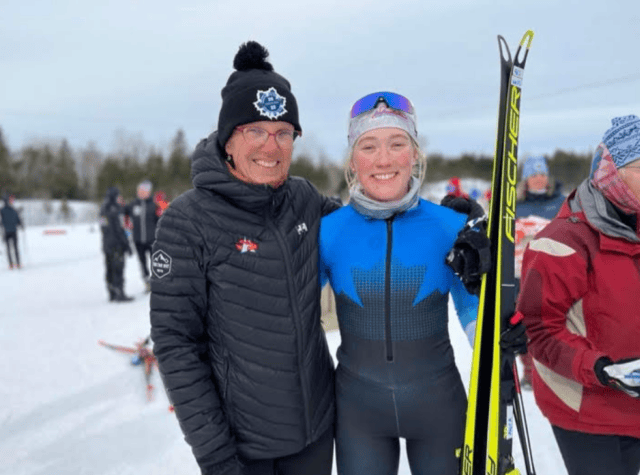

National Winter Sports Development Association Gives the Gift of Consistency
The return on investment is there, in plain view. You can see it in precious medals hanging around necks and in places of pride on podiums. You can see it in growing recognition of the names, the progress, abilities, and accomplishments of Canadian skiers.
Just this past February, the return on investment was seen in the Alpine valley of Planica, Slovenia, when 21-year-old Sonjaa Schmidt from Whitehorse YT. made history by becoming the first Canadian woman to win a gold medal in cross country skiing at the FIS Nordic U23 World Ski Championships. And again when Derek Deuling, another Whitehorse skier, teamed with Jasmine Drolet of Rossland, B.C., Max Hollmann of Thunder Bay, Ont., and Quebec City’s Liliane Gagnon to claim gold in the mixed team relay at the same event.

L-R: Derek Deuling (Yukon), Liliane Gagnon (Quebec), Jasmine Drolet (British Colombia), Max Hollmann (Ontario) celebrate gold at the 2024 U23 FIS Nordic World Ski Championships in Planica, SLO
In these, and in the lead-up to many other Canadian cross-country ski achievements, the National Winter Sports Development Association (NWSDA) played a quiet but vital role.
Formed in 2008 as an initiative launched by B.C.-born business titan and philanthropist Bob Disbrow with his family, the NWSDA has provided a consistent stream of funding support in developing cross country skiers from coast to coast to coast. The funding is centered on helping clubs pay for and develop coaches who will allow internationally competitive athletes to flourish. The funding also helps clubs make coaching a more attractive profession by supporting professional development and funding pension and health benefits.
Bob Disbrow is no stranger to sports innovation, being among a group of individuals responsible for introducing the first two generations of six-person outrigger canoes to Canada. He and wife Kim Kawaguchi began participating with the Lotus Sports Club cross country skiing group in the 1980s, and it quickly grew into a shared passion.
In 2001, while vacationing at Soldier Hollow, the site of the 2002 Olympics, Bob and Kim were impressed by Team Canada’s performance at the World Cup test event. This inspired them to become key supporters leading into the 2002 Olympics and beyond.
Following the team’s Olympic medal successes in 2006, Bob, Kim, and their children Fei and Brent recognized the necessity for continued support in Canadian cross-country skiing, leading to the establishment of the NWSDA in 2008, where they now serve on the board of directors.
Over the past decade alone, the NWSDA has invested $1.4M into cross country ski development through its partnership with Nordiq Canada and full-service ski clubs.
Jen MacKeigan, coach of the Whitehorse Cross Country Ski Club, fully understands the vital role the NWSDA plays in helping transform young talents into high-performance skiers.
“It (the NWSDA) helps provide continuous coaching, which is absolutely key for athletes,’’ says MacKeigan. “Sonjaa and Derek, for the developing part of their careers, always had the same head coach, so they weren’t constantly trying to adjust or adapt to a new person when they were learning some major lessons.
“We’ve seen some amazing things happen (in the Yukon). Over the years, we have produced a lot of Olympians and Paralympians – Emily and Graham (Nishikawa), Knute (Johnsgaard). This year Sasha (Masson) made the World Cup team.
“Then, of course, Derek, after coming back from injury, and Sonjaa delivering those amazing results in the Under-23s, as well.
“If you’re constantly with one coach, your growth and progression go quicker. In that kind of partnership, you have to try and learn how each other works, to give and get feedback, learning how to teach them – so that when there’s a problem, you think: ‘OK, I know how to address this; how to fix this.’ You know what you’re working on from session to session or season to season.
“I haven’t coached anywhere else, just the Yukon kids for the past four years, so I can’t speak of other places, but I can see how beneficial it is for our program and I don’t think we would be as successful if we were constantly changing coaches.”
Consider for a moment that 19 out of 20 Canadians who participated in the most recent World Juniors and Under-23 Championships have been impacted by NWSDA funding, as have many Olympians.
This year’s NWSDA funding was shared across the country between six local clubs in British Columbia, five in Quebec, three in each of Alberta and Ontario, and one each in the Yukon and New Brunswick. Nordiq Canada works with the NWSDA to select and support the clubs that will receive financial support.
Andrea Stapff rowed for Canada at both the 1980 and 1984 Summer Olympic Games before U-turning into another sporting love with a coaching position at the Bulkley Valley Cross Country Ski Club in Smithers, B.C..
“An important piece is for the club to be a full-service club, offering everything from recreational programs to high-performance programs,’’ Stapff explains.” All the way from skill development to racer development.
“These sorts of grants make that possible, help put in place the leadership required to steer that kind of development, versus an entirely volunteer basis. Those clubs still function and do well but there’s a big difference when there’s leadership that has the professional expertise to be able to pull those things together, from coaching at the grassroots level to the high-performance level. That professionalism of day-to-day support that NWSDA funding allows, provides that extra expertise to help steer gifted skiers to lofty heights.
“There is a recognition now that you can’t do this over the long term as a volunteer,’’ Stapff says. “People don’t come into this line of work looking to make the dollars. They come in because they love it. I love skiing. It’s my thing. Being able to do those together and being active at the same time, as a profession, is bonus-bonus.
“Then being able to work with kids and parents who are go-getters, achievers, they want to be successful so they’re willing to try, to put themselves out, to work hard – cross-country skiing is hard, not at all easy – so it brings a unique population to the sport.
“From my perspective, in my position, knowing the club has this kind of funding makes me feel better that there’s going to be a job in the future, also that there’s commitment by the club to working with a professional in a professional capacity.
“Having this support in place certainly makes me feel better in coaching as a profession. It’s a fairly niche profession, a developing profession, I think in lots of ways an undervalued profession. What this is doing is providing the value in a concrete way.”
That continuity Jen MacKeigan spoke of is echoed by Stapff.
“Continuity is vital for all parties – for the coach, the athletes, the families involved, the people you work with at the club,’’ she emphasizes.
“I’ve been in the role for a while, and when I started as a volunteer coach at the beginning, there were kids five years old and I coached them right through until their Grade 12 high-school year. Then they left the program and went on to bigger and better things, skiing World Cups and things like that. Kinda cool to see; to have been a part of it.
“The thing also to recognize is that those athletes winning U-23s this year are not a result of just the last couple of seasons. That’s the development of a very young skier coming through a club program, with some consistency, wherever they lived, getting good coaching right from the get-go.”
The journey from eager beginner to U-23, World Cup or Olympic medalist doesn’t happen overnight. It takes years of sustained commitment. From skiers, coaches, club administrators and staff. Along with loyal, in-it-for-the-long-haul financial partners such as the National Winter Sports Development Association.
But the return on investment is there, in plain view.
“This kind of support on a regular basis, when some of the funding that happens at the other levels ebbs and flows,’’ emphasizes Stapff, “is huge.”
“Much of (other funding) impacts only the top end, not the bottom end, where it all starts.
“But these sorts of commitments, by the Disbrow and Kawaguchi family, this Foundation, puts funding at the grassroots level to help develop the sport. A sport I love.
“Without something like that it would far, far more challenging.”

